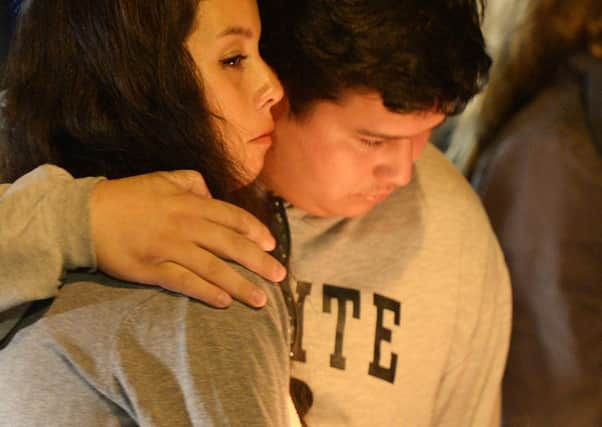Parent’s fury over US gun laws after six shot dead


“Our son Christopher and six others are dead,” Richard Martinez said outside a sheriff’s station – the day after the shootings near the University of California, Santa Barbara, where his 20-year-old son was a sophomore. “You don’t think it’ll happen to your child until it does.”
Christopher Ross Michaels-Martinez, of Los Osos, California, was the last of six people killed by suspect Elliot Rodger before the gunman apparently shot and killed himself, authorities said.
Advertisement
Hide AdAdvertisement
Hide AdMr Martinez choked back tears as he spoke, then grew angrier as he talked about gun laws and lobbyists.
“They talk about gun rights. What about Chris’ right to live?” Mr Martinez said. “When will enough people say: Stop this madness! We don’t have to live like this! Too many people have died!”
He then punctuated his words as he said: “We should say to ourselves: ‘Not! One! More!”’ before dissolving into tears and falling to his knees as he stepped from the podium.
Mr Martinez said he talked to his son just 45 minutes before he died inside the IV Deli Mart, where bullet holes and blood could still be seen. After already killing five others at his apartment and outside a sorority house, Rodger walked into the deli and shot Mr Michaels-Martinez, authorities said.
Mr Michaels-Martinez was an English major who planned to go to London next year and to law school after graduation, his father said.
He pulled out a photo of his son as a small child in a Chicago Cubs baseball uniform and said they used to call him “mini-Sammy Sosa,” referring to the former Cubs star.
“Chris was a really great kid,” Mr Martinez said. “Ask anyone who knew him. His death has left our family lost and broken.”
The grieving father spoke out as more details have started to emerge about the killer’s chilling manifesto written before his shooting rampage.
Advertisement
Hide AdAdvertisement
Hide AdRodger, the son of a Hollywood director, stabbed three people to death in his residence. He then went to a nearby sorority house and knocked on the door. No-one answered, and shortly afterwards he shot three women standing outside, killing students Katie Cooper, 22, and Veronica Weiss, 19.
He then went to a nearby delicatessen in the town of Isla Vista and shot Mr Michael-Martinez before fleeing in his car.
Rodger, who posted a threatening video online railing against women shortly before his rampage, then killed himself after a shootout with sheriff’s deputies, police said.
But less than a month before he launched his deadly attacks, after he had planned the killings and obtained the guns he would use, the community college student opened his door to a knock to find about seven officers looking for him.
“I had the striking and devastating fear someone had somehow discovered what I was planning to do, and reported me for it,” Rodger said in a manifesto.
In a YouTube video posted before the rampage, a young man believed by police to be Rodger bitterly complained of loneliness and rejection by women and outlined his plan to kill those he believed spurned him.
Santa Barbara County Sheriff Bill Brown has said that Rodger was seen by a variety of health care professionals and it was “very, very apparent he was severely mentally disturbed”.
He said his department had been in contact with Rodger three times prior to the killings, including for a welfare check in which deputies found him to be polite and courteous. He did not appear to meet criteria to be held involuntarily on mental health grounds, and deputies took no further action, he added.
Advertisement
Hide AdAdvertisement
Hide Ad“At the time the deputies interacted with him, he was able to convince them that he was OK,” the sheriff said.
“When you read his autobiography and the manifesto that he wrote, it’s very apparent that he was able to convince many people for many years that he didn’t have this deep, underlying, obvious mental illness that ultimately manifested itself in this terrible tragedy,” he added.